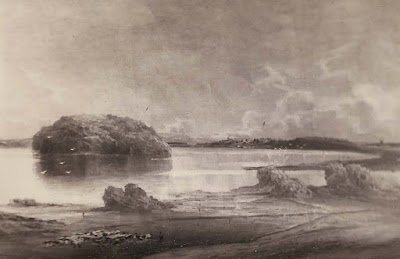 |
| The view from my porch in Abaco, the island where I grew up |
 |
| The view from what would have been my home had I grown up in East Prussia like my mom |
 |
| Swans on the lake in Guja |
Two cooing tobacco doves were perched in the branches of the old gum elemi tree beside the wall. I listened to their song for a long time and then, suddenly, with a flutter of wings they took flight, vanishing into the thick forest that slopes down to the sea. Something in their swift and unexpected movements made me think about my parents, Ejnar and Owanta Gottlieb who, like the characters in my novel The Last Daughter of Prussia, left their homes in Germany and fled into the unknown.
 |
| My parents, Ejnar and Owanta on their wedding day in 1944 during WW2 |
Luckily for me, my parents, ended up in the Bahamas, this beautiful chain of glimmering islands surrounded by colorful reefs and swaying sea fans. But what a change it must have been for them! The icy winds of winter replaced by warm, tropical breezes, the snows by fine white sand, the bombs and gunshots finally silenced by the sound of lapping waves upon the shore. They must have felt they were living a dream when they climbed out of the small seaplane that finally brought them to Grand Bahama, the island where my father was first employed at a lumber camp as a medical doctor.
 |
| My father arriving at Northbeach, Grand Bahama after a journey to Nassau where he purchased his medical supplies. He's the man standing at the back of the dinghy. |
How strange it must have been for them to imagine that this paradise existed while the war in Europe was destroying so many people. But that is is another story and anyone who is interested can read my mother's autobiography Angel Stand by Me. It is an fascinating account of the journey she and my father took from Germany to the Bahamas and it tells of both the difficulties and the fulfilling life they created here.
But I digress. What I really want to give you, the reader, is a glimpse into the differences and similarities of life and landscapes in both parts of the world. As always photographs are portals that allow more insight than a thousand words.
People
 |
| Whereas in East Prussia my mom was friendly with the Roma Gypises, in the Bahamas she took care of the native Bahamians, delivering babies and tending to the sick with my dad. |
 |
| My parents opening the door to their little clinic in Grand Bahama. (1948) It was just a shack but the people came from miles around to see the doctor. |
Hunting
 |
| In East Prussia, the hunt was on for all sorts of game. Here you see the Guja estate forester, Herr Hellwig, holding a pheasant he'd shot. |
Horses
 |
| (Courtesy of Erhard Schulte who wrote a most informative book entitled Trakehnens Pferde This Trakehner horse is the perfect expression of everything I imagine my equine hero Aztec in the novel to be. Trakehner horses were the proud symbol of East Prussia. They were nearly brought to extinction because of the war. |
 |
| This is a wild horse of Abaco - a proud descendent of the Spanish Barb brought here by Columbus. His eyes are blue. Like the Trakehners after WW2, these horses are very endangered by man's encroachment upon their natural feeding habitat. When I was growing up the herd consisted of 200 powerful animals that grazed in the pine forests and galloped along our sandy shores. Now there are only 8 remaining. |
 |
| Part of the dwindling herd of Abaco horses In Trakehnen, East Prussia there were hundreds of horses on the meadows. |
As I post these photos and put together pieces of my life and family history, I realize that the archive of untold stories and unpublished pictures is vast – too vast for one post. So many impressions from childhood to this moment have influenced the writing of my novel. They are the configurations of my very being. And...I promise to bring you more.
(c) All content and photos are the private property of the Gottlieb family, unless otherwise stated or linked, and may not be used without permission.
(c) Privatbesi




How amazing to see these two worlds ... a paradise lost and a paradise found ... one door closing, another opening. Thank you for this touching look into your family history. I am such a fan of the stories about your parents' early days in Grand Bahama, as well as their adventures in Abaco, which you so beautifully tell in "Sand In My Shoes: A Collection of Island Stories". I am so looking forward to turning the first page of the new "Last Daughter of Prussia" book in the near future. Thanks so much for sharing this inspiring story.
ReplyDelete